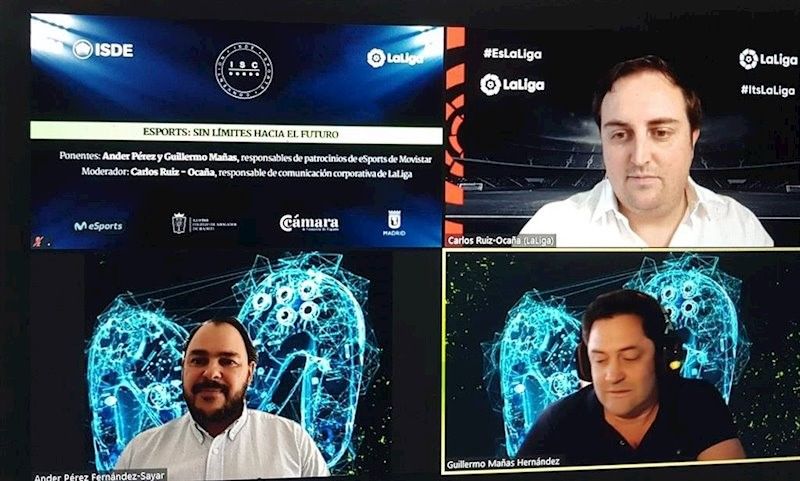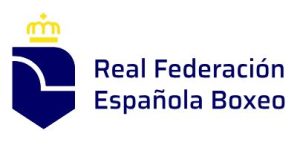
ESPORTS, AN “ATTRACTIVE” MARKET FOR BRANDS AND A “CHANGING” ALTERNATIVE TO TRADITIONAL ENTERTAINMENT
eSports is an “attractive” market for sponsors as an alternative to traditional entertainment, said the Heads of Sponsorship and eSports at Movistar Ander Pérez and Guillermo Mañas at the ISDE Webinar, the online talk promoted by the Instituto Superior de Derecho y Economía (ISDE) as part of the ISDE Sports Convention (ISC).
Under the title ‘eSports: No limits to the future’, both experts outlined the prospects of a social phenomenon that last year had a turnover of more than 35 million euros, more than 2.9 million fans, 600 employees and more than 250 professional players in Spain, according to the yearbook published by the Spanish Association of Video Games (AEVI).
“eSports is the final conclusion of something that started 30 years ago, which is gaming. It has evolved over the years and the great revolution is network gaming. This, taken to the extreme, leads to professional gamers, who are the tip of the iceberg. Is it a sport or not? The codes are very similar in terms of commitment, strategy, nutrition, physical and psychological preparation,” said Ander Pérez.
The sports marketing expert, who has worked at Movistar for more than 20 years, compared professional eSports clubs with football clubs. “The players are professionals, but it is entertainment under construction. The sector has to be organised, the teams, the competitions; public institutions are getting involved, but they are not regulating it. Labour protection and the organisation of the event are being regulated,” Perez said.
In his opinion, traditional entertainment is pretty much monopolised by a number of brands and requires a very large investment, so all brands are considering entering gaming. “There are two reasons: the age range makes it attractive, and connectivity is essential. We are part of the game here. The IOC is looking at it and its opinion will be favourable. It cannot turn its back on a reality that has thousands of fans. It won’t be long before we see Olympic eSports competitions,” he predicted.
For his part, Guillermo Mañas agreed with his Movistar sponsorship colleague that it is not the most important question to consider whether eSports is a sport or not. “The most important thing is that it is the entertainment of a generation. It is the professional layer of video games, but not all video games are eSports. In gaming everyone can play; eSports is competition, strategy, engineers over 20 years old planning a career,” he compared.
Mañas admitted that the fact that there are two major organisers in Spain, the Liga de Videojuegos Profesional (LVP), supported by the Mediapro Group, and ESL can generate a “confusing” context for brands. “The sector is under construction and that means that each brand has its own niche. eSports was born in a room, where we are now, and when all this is over I invite everyone to come to Madrid Games Week. The only positive thing about this pandemic is that it has mixed traditional and digital entertainment. And it has worked well. Ibai (Llanos) was a League of Legends icon and now he broadcasts races, basketball games. He has merged generations,” he said.
VIDEO GAMES: A 1.5 BILLION INDUSTRY
In 2019, the video game industry in Spain recorded a turnover of nearly 1.5 billion (1,479) euros thanks to the almost 15 million gamers (8.8 men and 6.3 women) who consume the product an average of 6.7 hours a week, buying 8.5 units of video games and 1.1 million game consoles.
In addition, Madrid Games Week, the festival that brings together brands and fans of video game consoles, once again broke all-time records with more than 250 exhibitors and 139,000 visitors to the IFEMA exhibition centre in the Spanish capital. And the last World Final of the League of Legends video game recorded an audience of 3.7 million viewers.
This is the fourth ISDE Webinar during the state of health emergency decreed by the COVID-19 pandemic, within the ISC, the congress on law and the sports industry organised by ISDE, in collaboration with La Liga, the Madrid Chamber of Commerce and the Madrid Bar Association.
In the previous sessions, the Brazilian lawyer Daniel Cravo, expert in sports law at ISDE and member of the Executive Committee of the International Association of Football Lawyers (AIAF), and the Director of the Women’s Football Area of La Liga, Pedro Malabia, took part.
Brazilian lawyer and ISDE professor Marcos Motta also spoke, reflecting on the challenges facing the transfer system and football agents in the face of the health and economic crisis caused by COVID-19, which has led to the postponement of major championships, including La Liga Santander, the Premier League, Serie A, the Bundesliga and the French league.








